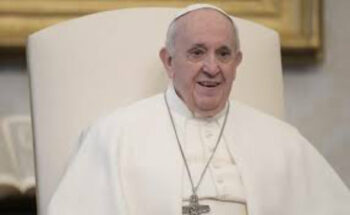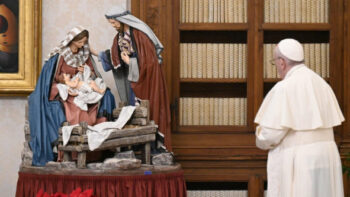Witnesses of the Cross – Light in Darkness
 Our witness can be weakened by worldliness and mediocrity. The cross demands instead a limpid testimony. For the cross is not a flag to wave, but the pure source of a new way of living. And this new way is that of the Gospel, that of the Beatitudes. A witness who bears the cross in his or her heart, and not only on his or her neck, views no one as an enemy, but everyone as a brother or sister for whom Jesus gave his life. A witness of the cross does not dwell on the wrongs of the past or keep lamenting the present. Witnesses of the cross do not employ the ways of deception and worldly pretension. They do not want to impose themselves and their own, but to give their lives for others. They seek not their own advantage, in order to be seen as devout. This would be a religion of hypocrisy, not a witness to the crucified Lord. Witnesses of the cross have but one strategy, that of the Master -- humble love. They do not look for triumphs here below, because they know that the love of Christ bears fruit in the events of daily life, renewing all things from within, like the seed that falls to the ground, dies and produces much fruit.
Our witness can be weakened by worldliness and mediocrity. The cross demands instead a limpid testimony. For the cross is not a flag to wave, but the pure source of a new way of living. And this new way is that of the Gospel, that of the Beatitudes. A witness who bears the cross in his or her heart, and not only on his or her neck, views no one as an enemy, but everyone as a brother or sister for whom Jesus gave his life. A witness of the cross does not dwell on the wrongs of the past or keep lamenting the present. Witnesses of the cross do not employ the ways of deception and worldly pretension. They do not want to impose themselves and their own, but to give their lives for others. They seek not their own advantage, in order to be seen as devout. This would be a religion of hypocrisy, not a witness to the crucified Lord. Witnesses of the cross have but one strategy, that of the Master -- humble love. They do not look for triumphs here below, because they know that the love of Christ bears fruit in the events of daily life, renewing all things from within, like the seed that falls to the ground, dies and produces much fruit.
Homily in Slovakia, 14 September 2021
Light to the darkness
 Let us never forget this: faith cannot be reduced to a sweetener to make life more palatable. Jesus is a sign of contradiction. He came to bring light to the darkness, exposing the darkness for what it is and forcing it to submit to him. For this reason, the darkness always fights against him. Those who accept Christ in their lives will rise. Those who reject him remain in the darkness, to their own ruin. Jesus told his disciples that he came to bring not peace but a sword (cf. Matthew 10:34). Indeed, his word, like a two-edged sword, pierces our life, separating light from darkness and demanding a decision. His word demands of us, “Choose!” Where Jesus is concerned, we cannot remain lukewarm, with a foot in both camps. We cannot. When I accept him, he reveals my contradictions, my idols, my temptations. He becomes my resurrection, the one who always lifts me up when I fall, the one who takes me by the hand and lets me start anew. He always lifts me up.
Let us never forget this: faith cannot be reduced to a sweetener to make life more palatable. Jesus is a sign of contradiction. He came to bring light to the darkness, exposing the darkness for what it is and forcing it to submit to him. For this reason, the darkness always fights against him. Those who accept Christ in their lives will rise. Those who reject him remain in the darkness, to their own ruin. Jesus told his disciples that he came to bring not peace but a sword (cf. Matthew 10:34). Indeed, his word, like a two-edged sword, pierces our life, separating light from darkness and demanding a decision. His word demands of us, “Choose!” Where Jesus is concerned, we cannot remain lukewarm, with a foot in both camps. We cannot. When I accept him, he reveals my contradictions, my idols, my temptations. He becomes my resurrection, the one who always lifts me up when I fall, the one who takes me by the hand and lets me start anew. He always lifts me up.
Homily in Slovakia on the Esplanade of the National Shrine, 15 September 2021
Christmas
To us a son is given. In the lowly manger of a darkened stable, the Son of God is truly present. But this raises yet another question. Why was he born at night, without decent accommodation, in poverty and rejection, when he deserved to be born as the greatest of kings in the finest of palaces? Why? To make us understand the immensity of his love for our human condition, even to touching the depths of our poverty with his concrete love.
The Son of God was born an outcast, in order to tell us that every outcast is a child of God. He came into the world as each child comes into the world, weak and vulnerable, so that we can learn to accept our weaknesses with tender love. And to discover something important: as he did in Bethlehem, so too with us, God loves to work wonders through our poverty. He placed the whole of our salvation in the manger of a stable. He is unafraid of our poverty, so let us allow his mercy to transform it completely!
To us a son is given. Parents of little children know how much love and patience they require. We have to feed them, look after them, bathe them and care for their vulnerability and their needs, which are often difficult to understand. A child makes us feel loved but can also teach us how to love. God was born a child in order to encourage us to care for others. His quiet tears make us realise the uselessness of our many impatient outbursts. And we have so many of them! His disarming love reminds us that our time is not to be spent in feeling sorry for ourselves, but in comforting the tears of the suffering. God came among us in poverty and need, to tell us that in serving the poor, we will show our love for him. From this night onward, as a poet wrote, “God’s residence is next to mine, his furniture is love” (Emily Dickinson, Poems, XVII).
To us a son is given. Jesus, you are the Child who makes me a child. You love me as I am, not as I imagine myself to be. In embracing you, the Child of the manger, I once more embrace my life. In welcoming you, the Bread of life, I too desire to give my life. You, my Saviour, teach me to serve. You, who did not leave me alone, help me to comfort your brothers and sisters, for you know that, from this night forward, all are my brothers and sisters.
Homily at Midnight Mass,
25 December 2020
 Entries(RSS)
Entries(RSS)